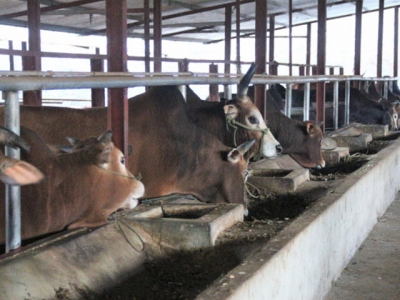The land with great potential for cattle development

With natural conditions and appropriate development policies, Son La province has many advantages in developing large livestock on a regional scale.
Deputy Minister Phung Duc Tien said that the province should select and prioritize indigenous breeds to help preserve and develop specific and endemic genetic resources. Photo: Pham Hieu.
Lots of fiscal space
According to the Department of Livestock Production, Son La province has a particular advantage in livestock production, especially large cattle. The province has a relatively flat topography, with two extensive plateaus: Moc Chau (average height of 1,050 meters) and Son La (average height of 600 meters).
With the third-largest area in the country, Son La province's topography is divided into many regions. 97% of the province's natural area belongs to Da and Ma rivers. Alluvium from these two rivers has built up valleys, forming extensive grasslands in the East (Moc Chau district), suitable for raising cattle.
Currently, Son La province is one of the provinces with the largest cattle herd in the country, with more than 1.3 million heads. Besides, Son La province's pig herd is also in the country's top 10, with more than 640,000 heads.
Regarding poultry, Son La province's quantity is average compared to the whole country (about 7.3 million heads), but mainly local specialty products. People in the province have a long tradition and experience and a good understanding, awareness, and consciousness of animal husbandry.
"Son La province still has a lot of fiscal space for the livestock development. However, the demand for specialties such as buffalo meat and beef in the Northwest market is great. With the market response rate for these new products about 33%, Son La province has many opportunities to develop the output", said Mr. Duong Tat Thang, Director of the Department of Livestock Production (MARD), shared in the visit to Son La on 11 December.
In the project "Sustainable livestock production development in the province to 2025, with the view to 2030", Son La province aims to promote the livestock industry and large cattle-raising sustainably.
The project sets out to change people's breeding habits towards sustainability. In which, shifting from the scattered and small-scale husbandry method to the concentrated husbandry method with farm and industrial scales.
Son La province has issued documents directing functional sectors to propagate to breeders to focus on raising livestock towards smart agriculture, organic agriculture, application of high technology, and diseases safety, veterinary hygiene, and environmental protection.
In addition, Son La province is actively developing livestock production along the value chain, linking production, and ensuring welfare for farmers and consumers.
Director of the Department of Livestock Production, Mr. Duong Tat Thang, said that Son La province had formed professional closed cattle breeding models. The province can ultimately expand these models. However, the province also has limitations, such as the cowherd showing signs of recession. He advised Son La province to consider improving the cow herd by artificial insemination.
"For other livestock species such as pigs and poultry, Son La province needs to be re-planned methodically environmentally friendly. The province should also have policies to encourage large enterprises to invest in livestock raising, helping to change people's awareness and farming habits," Mr.Thang said.
Promoting cows' advantage
In addition to examining the situation of livestock development, the delegation of the Ministry of Agriculture and Rural Development is also interested in the prevention of cold and animal diseases for livestock in Son La province.
Visiting many livestock production facilities, Deputy Minister Phung Duc Tien highly appreciated the efforts of the authorities and people of Son La province in agriculture restructuring. "The contribution rate of agriculture to the province's economic development in 2021 will reach and exceed. It is the clearest evidence of the effectiveness of implemented methods," he commented.
Deputy Minister Phung Duc Tien assessed that Son La province has significant advantages in developing dairy cows. He suggested that provincial leaders strengthen business linkages to have a plan to increase capacity, increase technology content, and help promote milk exports to the Chinese market.
With the development of traditional beef cattle herds, leaders of the Ministry of Agriculture and Rural Development advised Son La province to study investment programs and encourage the model of household farming in an organized and synchronous manner.
Regarding poultry, Deputy Minister Phung Duc Tien said that the province should select and prioritize indigenous breeds to help preserve and develop specific and endemic genetic resources.
Until the Lunar New Year, the weather has many complicated changes, the risk of severe cold, harmful cold. Deputy Minister Phung Duc Tien emphasized: "Son La province needs to propagate and guide livestock raising households to source pure and raw food to ensure nutrition proactively; and repair, build and cover barns for livestock, help prevent cold for livestock effectively".
Related news
 Sóc Trăng Province increases exports of milk star apple to US to 10 tonnes
Sóc Trăng Province increases exports of milk star apple to US to 10 tonnes The Cửu Long (Mekong) Delta province of Sóc Trăng has exported four more tonnes of milk star apple to the US taking the total for this year to 10 tonnes.
 Squid and octopi exports increase, but raw materials lacking
Squid and octopi exports increase, but raw materials lacking Exporting squid and octopi to many key markets has maintained good growth momentum. However, due to limited supply, businesses are worried about lack of product
 Global farmers facing fertiliser sticker shock may cut use, raising food security risks
Global farmers facing fertiliser sticker shock may cut use, raising food security risks From Brazilian corn to Malaysian durians, are at risk after tight supplies and blistering prices of fertiliser have caused farmers to scrimp on vital crop